The Science Behind Food-Grade rPET: From Collection to Packaging Safety
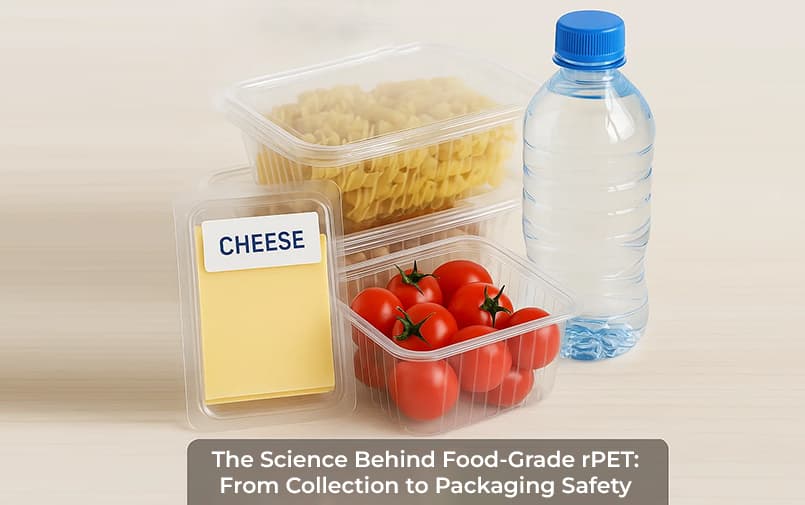
There’s a quiet science behind the plastic bottle you hold in your hand. Not the chemistry of its shape or strength, but the unseen process that decides whether it’s safe enough to return to shelves again, filled with something you'll drink, eat, or trust.
The shift toward bottle-to-bottle recycling in India isn’t just a response to regulation or consumer demand. It’s a reimagining of material value. And for packaging manufacturers navigating a tightening regulatory landscape, this shift opens doors and responsibilities.
The Real Mechanics: How Food-Grade rPET Is Made
The rPET production process for food-grade packaging doesn’t begin at the plant. It begins at the bin. With collection systems sorting clear PET bottles from a complex stream of post-consumer waste. From there, a meticulous transformation begins:
1. Bottles are cleaned using multi-stage hot washes
2. Flakes are separated by color and polymer density
3. Decontamination takes place under high vacuum and temperature conditions
4. Solid State Polycondensation (SSP) restores chain length and boosts intrinsic viscosity
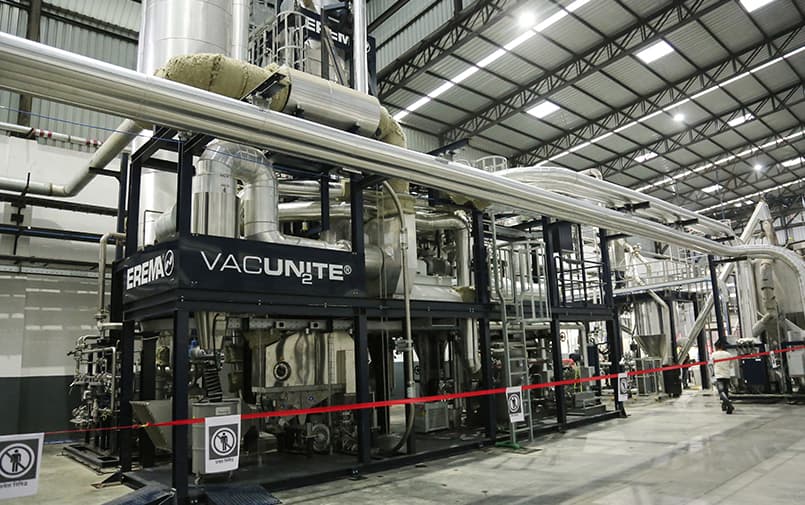
Technologies like Erema Vacunite™ add another layer of assurance. Using nitrogen atmosphere and vacuum-assisted SSP, the process ensures removal of contaminants and consistent quality. These aren’t just technical upgrades. They are the tools that make food contact compliance possible.
The Human Chain: From Collection to Trust
Before any of the science begins, the material must be collected. This part of the journey is often overlooked, yet it’s foundational.
Across India, informal waste collectors and aggregators play a key role in identifying and gathering PET bottles from homes, streets, and landfills. These collected bottles travel long distances—from villages, towns, and metro cities—eventually reaching authorized sorting units and recycling partners.
At this stage, partnerships are crucial. Trusted sourcing channels and pre-approved vendor agreements ensure that only food-contact safe streams of PET enter the pipeline. Collection centers use pre-sorting and bailing, while registered recyclers handle the cleaning, flaking, and transformation stages.
Permits and regulatory checks are embedded throughout this process. FSSAI-certified vendors, traceable transport systems, and audit trails help maintain control and transparency.
Trust, in this context, is not a vague promise. It is traceable. From bottle to bale, from bale to flake, and from flake to resin, each step is recorded and accountable. This is what packaging clients are increasingly demanding: not just resin, but proof of origin and a credible, closed-loop narrative.
Looking to build a traceable rPET supply chain for your food-grade packaging? Get in touch with JB Ecotex to explore safe, verified material streams.
What It Takes for rPET to Meet Food Contact Standards
It’s easy to assume that if a bottle looks clean, it is clean. But for a resin to qualify as food-grade rPET, it must meet far more stringent criteria.
Migration limits, toxicology data, and process traceability are just a few of the hurdles. In India, this compliance journey is governed by a network of frameworks:
1. FSSAI regulations set the groundwork for food safety. The agency has made it clear that recycled plastics in food contact must go through approved processes.
2. Plastic Waste Management (PWM) Rules, updated in 2022 and followed by a 2025 draft amendment, highlight source segregation and recyclability as core requirements.
3. Extended Producer Responsibility (EPR) mandates are shifting focus toward reuse and same-use recycling. It’s about showing where the plastic ends up, not just collecting it.
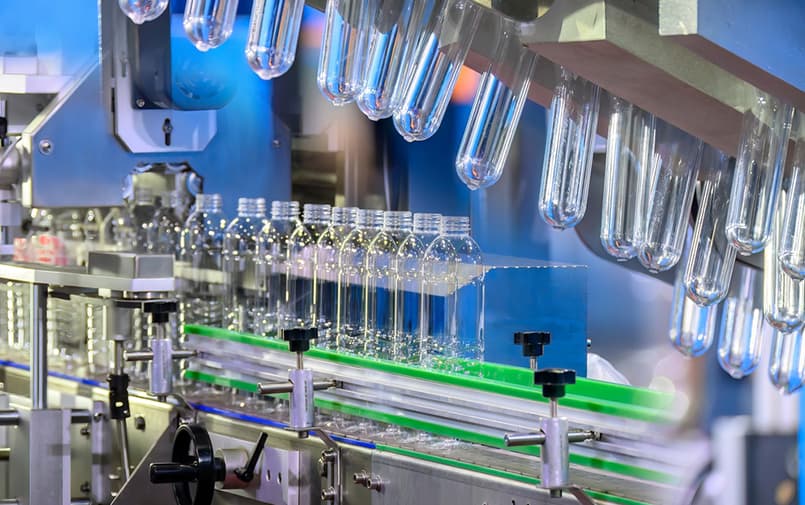
Recent regulatory proposals indicate that EPR credits may soon favor bottle-to-bottle recycling and other closed-loop systems. This signals that material traceability is becoming a central expectation.
It’s also worth noting that FSSAI approvals involve detailed submissions and strict audits. The path to approval isn’t just about having the right inputs, it’s about demonstrating a repeatable, closed-loop process with validated safety outcomes.
A Moment of Proof: Why Brands Need Traceable Resin
For manufacturers, packaging is a frontline conversation with consumers. And that conversation has changed. People now ask where their packaging comes from and whether it deserves to go back into circulation.
Using food-grade rPET lets manufacturers answer with confidence. But only if that resin comes from verified, high-purity streams. Traceability audits, batch records, and process transparency are fast becoming essential, not extra.
JB Ecotex has built its food-grade line around this philosophy. Every pellet has a story—one that can be tracked through mechanical steps, decontamination protocols, and independent validation.
To build on this capability, our sister company JBrPET Pvt. Ltd. is exploring chemically recycled rPET resins, a complementary route for high-performance, food-safe applications where mechanical recycling hits its limits.
Join the movement toward packaging transparency. Partner with JB Ecotex to integrate verified rPET into your food-grade applications.
You’ve already heard of Coca-Cola making commitments to recycled content. But so have homegrown Indian brands in FMCG and dairy. From water bottles to yogurt tubs, big players are switching to certified, traceable rPET to future-proof their packaging strategies.
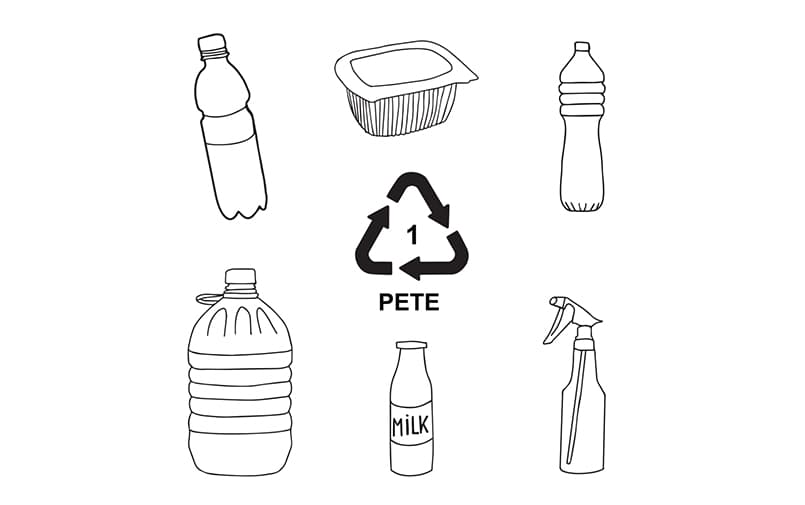
rPET for Packaging Safety: What India Must Get Right
India’s PET recycling ecosystem is vast. But to scale food-grade applications, it must evolve beyond bulk collection. Investments are needed in sortation infrastructure, wash lines, and quality assurance.
The idea is to define an Indian solution where economics and compliance align. With bottle-to-bottle recycling, manufacturers reclaim not just material, but trust. The kind that builds long-term partnerships with global buyers. Because the global landscape is moving fast in its acceptance of rPET in food applications.
The Long View: Circular Systems Over Short-Term Wins
A truly circular packaging system doesn’t begin at the factory floor. It starts with better design, flows through smarter supply chains, and ends with responsible collection. Then it begins again.
Bottle-to-bottle recycling embodies this idea. It keeps PET where it belongs, in circulation, without degrading its value or its safety. It offers manufacturers the opportunity to meet consumer expectations, reduce import dependencies, and prepare for what’s next.
Why It Matters Now
The future of packaging is shaped by the choices manufacturers make today: which resin they trust, which processes they align with, and how seriously they treat transparency.
Consumers are watching. Regulators are updating. Global buyers are sourcing with sharper eyes.
This is a new phase.
And in it, bottle-to-bottle recycling stands as a system of integrity and one that shows packaging can be safer, smarter, and more circular.
We’re already working with forward-looking manufacturers to close the loop. Talk to our team and find out how food-safe rPET can future-proof your packaging.
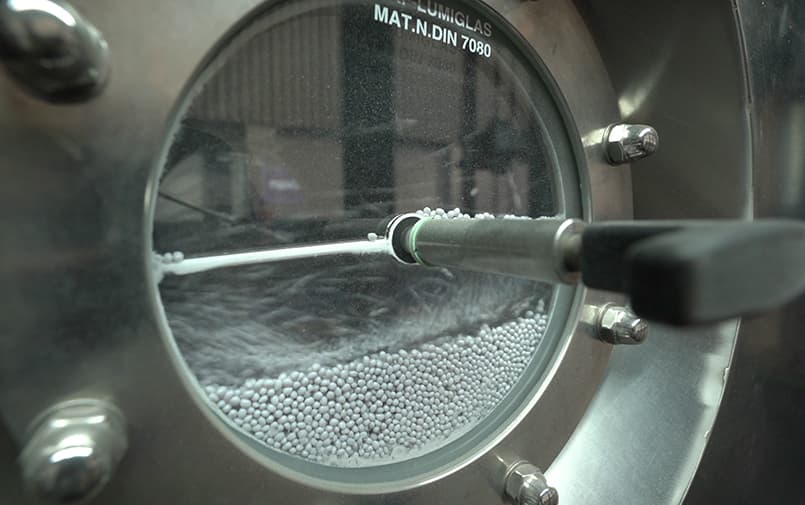
FAQs
1. What makes rPET suitable for food-grade applications?
Food-grade rPET must pass strict decontamination, migration, and safety testing. It’s produced in controlled environments with validated processes, ensuring it’s safe for direct food contact.
2. Is bottle-to-bottle recycling allowed under Indian regulations?
Yes. FSSAI allows recycled PET in food packaging, provided it comes from approved and traceable processes. New EPR guidelines are encouraging same-use recycling models like bottle-to-bottle.
3. How do I ensure my packaging partners supply food-safe rPET?
Ask for traceability documentation, third-party validation reports, and batch records. Also verify if the recycler uses certified technologies like Erema Vacunite™.
4. Are chemically recycled rPET resins allowed in food contact packaging?
Chemical recycling is gaining acceptance globally and being explored in India. Brands like JB rPET are developing certified streams specifically for food-grade applications.
5. Why is bottle-to-bottle recycling gaining traction in India now?
Because it aligns with global buyer expectations, offers local supply assurance, and meets India’s tightening packaging safety rules without compromising circularity.
JB Ecotex Ltd. is committed to helping manufacturers close the loop on packaging with integrity and purpose. If you’re looking to upgrade your supply chain, let’s talk.
